
Content
Welcome to the Club of Amsterdam Journal.
When people talk about disruptive technologies you usually think of a major shift in the way things work in a particular industry. But how disruptive can technology be? How about robotics and AI increasingly watching us and controlling us as our freedom seeps away? Or taking our jobs, and therefore our earnings, making money irrelevant? Then again, we’ll be largely irrelevant. Now that’s disruptive. – Paul Holister
The Future Now Show: Disruptive Technology Trends with Hardy F Schloer
Felix F Bopp, Founder & Chairman
Trip to China with Mike Rana – Part I
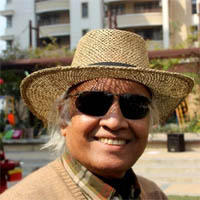
by Mike Rana
Creative Head & Founder, eFingertip, Consultant Social Networking
Mumbai, Maharashtra, India
China – 3 Hops
Dalian – Over The Waves
Recently I took an awesome trip to China. It was a bit perilous for an enfeebled and recuperating sick man, vegetarian and non-speaker of the language, and a complete novice at using the chop sticks. After return now I face probing questions from friends – Why Dalian? I have no convincing arguments but I guess I had a few friends in that city, so I chose it. With hind sight I feel it wasn’t a bad choice, for its weather, its resorts, its beaches, its eateries, its hotels, its skyline, and above all its people were entities of pleasure.
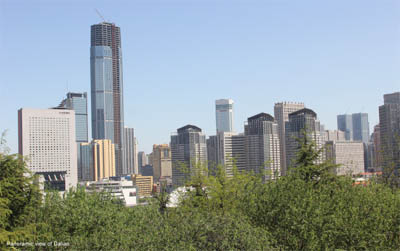
Contemporary and historic
China is a mystery veiled in hidden adventure. Even when the internet lays it bare in the rest of the world, you need a personal visit to nose around this enigma. When you’re in China, internet is partially blocked and censored. Sites like Gmail, Google and Map are not accessible, and if they are, they only function as a Virtual Private Network (VPN). And you must pay a subscription of monthly USD 20 or so.
Tencent QQ, popularly known as QQ (cute), is a popular Chinese emailing service. Today, it has 829 Million active QQ accounts and it also provides English translation. There is a WeChat platform that works like the Facebook. So in China there is nothing that prevents you from communicating.
A number of Chinese travelers existed in history. Faxian (400 AD) and Xuanzang (600 AD), and 56 Monks traveled to India in the 7th century. They called us “Yindus”. For ages the Chinese have made special efforts at learning about what existed in other countries, but have hesitated foreigners traveling to China. Even now they prefer giving visa to businessmen, with the expectation that money will ultimately flow in to China.
Of late, the reverse traffic is gaining grounds. The number of Chinese travelers internationally has more than doubled to 120 million tourists over the last five years, according to data from the China National Tourist Office. That means one in every 10 international travelers now comes from China. This year more than 215 Billion dollars may be spent by them abroad. The Chinese tend to begin traveling abroad once their household earnings exceed about $35,000 per year. And this tourism boom is encouraged by the government’s bigger plan to boost consumer spending and make the economy less dependent on manufacturing.
Preparations
Before I visited China a lot was heard from people. For example, The Great Wall of China was a metaphor for this forbidden territory. I was a bit nervous and my nervousness ran at peak when I decided to travel all by myself. I was recuperating from two large and recent operations. Stents were put in my carotid arteries. After these two brain operations I was vulnerable, because I could not speak well, not walk for long distances, not carry heavy weight and generally I was in danger for the slip of the stents. To go to a country where vegetarian food was a rarity and the language formidable, was quite an adventure.
There was one respite for me though, a Russian friend who lives in Dalian and speaks both Russian and Chinese, rather fluently. Her English is very primary and I had to resort to Russian when required. Nataliya put the squeeze on, and forced me to come. She has the bold spirits of the royal blood, inherited due to her being from the family (Romanova) of the Czars.
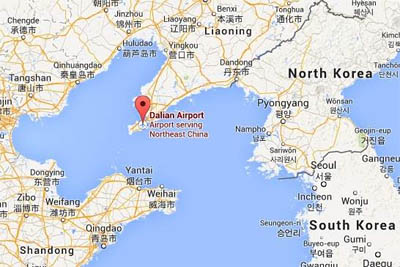
To make matters worse I decided to undertake the last leg of my travel, Beijing to Dalian on the Bullet train. “Bullet” was a hyped term in India and it captivated me to be on that train. Moreover, where else would I get that fortuitous chance to see the countryside and landscape.
I was expected to take a taxi from the airport to the Dalian railway station in Beijing. The Google maps show two railways stations in Beijing. Which of these I must choose remained ambiguous in my mind until I reached it actually. My email communications with Nataliya, had failed to resolve this dubiety due to language difficulties.
On the last day before departure my daughter Tanu, alarmed about this uncertainty was despised that I’d be struggling for information at Beijing. She insisted that I spoke to Nataliya on phone and arrange for an escort for myself. Nataliya fixed it while sitting in Dalian. I was able to speak to Maxim, my escort, from Delhi itself.
And off I went.
Hong Kong
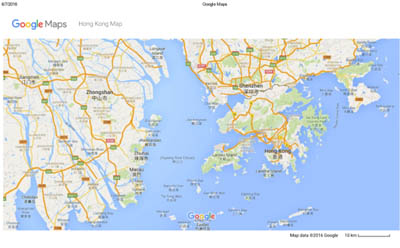
Hong Kong, a Cathy Pacific stopover, gave me two hours for the transfer. Time was short and that made me run amok, like a mad man. I carried my camera, bag and medicines and ran down the unfamiliar corridors of the airport, as if being chased. I was the only visible Indian at the airport. I wished that this airport had the luxury of deferred stopovers as on the Middle East flights. And wished they did something similar, to protect sales at the duty-free shops. But shopping was in full swing, early in the morning at that.
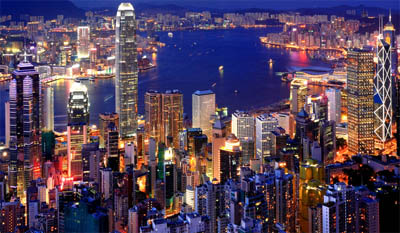
Luckily, everything went very well and I boarded the outbound plane at Hong Kong. How I wished that I had a window seat to view Hong Kong from the air, but the airline managed to compensate me; they placed an English speaking co-passenger next to me. I wasted no time in pleasantries and let it go at him , “Sir, what time we will land in Beijing”?
“3 hours approximately” he seemed cool, and gave me a business like smile. I tried to match him with an equally friendly smile.
The hostesses were helping the passengers with seats, luggage and tumblers of water. I finished the flight rituals rather quickly. I browsed the airline magazine, tightened the seat belt, and scanned for the fellow passengers around etc. Most of them were probably corporate customers going for work after the weekend in Hong Kong.
The plane was delayed a bit, I thought. People were still moving in and out of the plane. I waited for some minutes and then impatience started to take a toll on me. I asked the co-passenger rather hysterically, “This way, do you think I will have enough time at the Beijing airport”, I was looking at my wrist watch. Twenty minutes had passed after I entered the plane.
“Oh, are you not going to Beijing, then where to”
“To Dalian. I am catching the bullet train”, as if it was the ultimate luxury I was going to indulge into – an Indian frame of mind.
“Don’t worry, you have enough time”, he said looking at his own glamorous watch. “Provided this plane starts in time” he added rather sarcastically.
“Ah yes. Of course I have. But may be the checked in baggage will delay me”.
“Yes that might be cutting it too fine. You know what, always stick to one airline in all the legs. They will never leave you behind”.
“Yeah, but the bullet train was an attraction” I nodded.
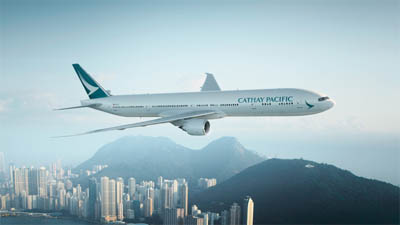
The plane was still standstill and this delay started to take a toll on me. I started shuffling positions while sitting. I saw it as a nightmare and imagined my plight in Beijing.
“What I should be doing when I land in Beijing. With only 2.30 hours in Beijing. I should run to the immigration, find the taxi man, take the taxi and reach the railway station”, I mumbled these lines to myself. “And I do not know Chinese”, was the caveat that I added.
It was now 30 minutes since I entered the plane. Even in normal situations, this was an exasperation but for me that day, it was no less than a catastrophe. I could probably miss the train at Beijing. My co-passenger saw my frustration, I think he heard me mumbling, “Do not worry. They are very professional at the airport. You will not be delayed”, he added.
Perhaps I must tell him the situation. Maybe he can guide me. “You know Sir, the train tickets are taken on-line and I have still to collect them”.
“Don’t you have them with you”?
“The ticket, yeah. They will be with the train booking office. They will only give it on production of passport”, I seemed to have scored a winner this time hoping that he will empathize with me.
“Yeah, that is normal. You need 10 minutes more for that. That cuts down your time a bit”.
I did not feel it necessary to tell him that the train bookings were done by Nataliya on her account on the internet. Any change in the ticket was possible only when she used her account. And she was in Dalian. Probably, I will have to be lodged up in a hotel for the night. My mind was in turmoil and the vibrations of the plane were milder in comparison.
Beijing
We landed at Beijing and a surprise awaited me. The belts for the checked-in baggage and the immigration counters were missing from the sight. Everyone was rushing to what I later saw, an un-piloted train, which would take us to those facilities. Not many airports in the world make you sweat for your baggage as they do it in Beijing. And when you are in shortage of time, just as I was, this could be daunting.
The luggage is delivered about 5 Kilometers away from where it landed. I waited for ages for it. I had enough time for a cuppa but no cafe was in sight. It was probably a good time to scan the passengers. To me they looked smartly dressed up as if they would leave for office directly.
Anyway, the luggage finally arrived and mine was among the last few (Murphy’s laws were in full swing). But the respite was that the immigration was done in a jiffy, unlike in the western countries. And I found Maxim. He was the very first man loitering near the exit gate. He waved vigorously the placard with my name on it, rather shabbily but recognizably.
To the railway station
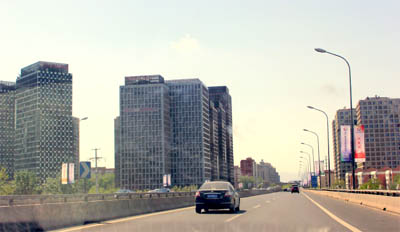
While I was debating in mind, which station I will go to, Maxim probably had the answer. He darted through the airport garages, at a speed that could put any marathon runner to shame. And here I was, scrambling to keep pace with him, and trying to put up a show that everything was normal. As I settled in his car, the luggage flashed in my mind and I asked him with butterflies fluttering in my stomach, “Did you put the baggage in the boot Maxim”?
“Da” was his short and crisp reply.
What a relief! I was in the car, complete with all my baggage, after immigrating to China and now on way to domestic travel, Wow. “Hurrah” I expressed and continued “Do you know which station we must go to”?
He did not answer but nodded. He was probably briefed by Nataliya. Knowing these Russians, they were almost perfect in their travel arrangements.
“Is this your own car or a taxi”. I knew that Russians used private cars as taxis, ’cause it was a convenient arrangement. But here I was checking if I was being waylaid. Then came the most important question, “Do you speak English”?
I knew beyond doubt that a standard answer will follow, “A little English”, and I knew what it meant. I had heard it amply during my trips to Russia. Simply stating it meant “Shut up with your English”.
On the driver’s seat he was alert, had good reflexes and probably deserved a pat on back. So I took time off him and focused on my camera. I was in China for the first time and did not want to miss these shots. I was in motion, and perhaps a video was more appropriate here, but the jolting in the car and brakes kept me away from it.
The part of Beijing where we were moving was like any other metropolitan city; nothing astounding but nevertheless intriguing. It had a mix of high and low rise buildings, both new and old, and almost perfect roads. The metro line running aside us at a few places.
The road was complete with signage and it did not have the familiar pot holes that are common in India. The billboards were neatly organised. I noticed the advertisements were devoid of the traditional communist pictures depicting peasants or workers with large faces. There were actually commercial ads on them.
I noticed that Maxim was following the traffic lanes almost meticulously in spite of being in hurry. Even when a side lane was available free, he did not grab it. Nor he jumped a red light. I came to know later on that Chinese were disciplined on the roads, and one did notice the absence of traffic police.
At the railway station
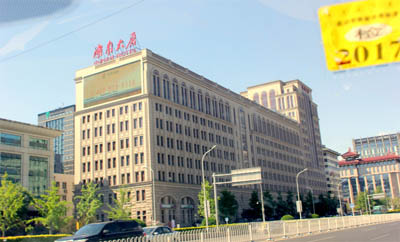
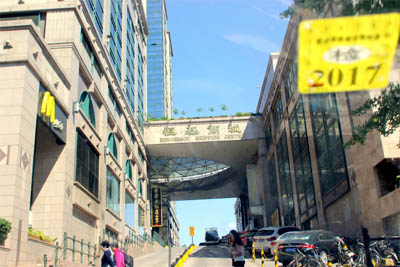
The very impressive Hunan Hotel was on our right when we took a U-turn and landed on the side of the Henderson Shopping Centre. The crowd here was thin and Maxim managed to find some parking place. And then, he carried my baggage and his run for life again started.
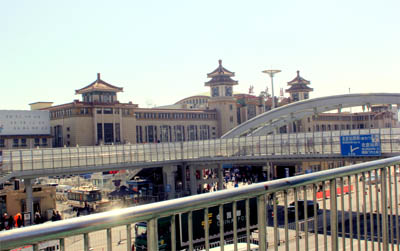
He climbed the never-ending stairs and took the over bridge to cross over to the railway station. It was a bright day and the sun shone almost on our heads. He waited at least three times on the over bridge for me to catch up. By then, I had completely forgotten that I was barred from running or lifting weight. The enthusiasm of travel to China, was ruling my mind.
People, a lot of them were now around, taking care of families and forging ahead towards the entry. Large queues were built up on the booking windows and my heart sank looking at those queues.
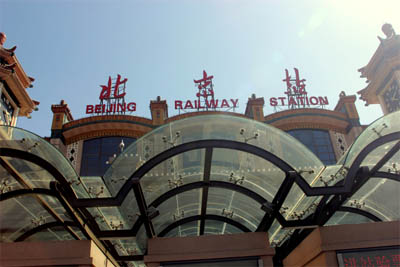
Then it all came like a bang. Maxim demanded my Passport. Apparently he wanted to collect my ticket. In a foreign country, knowing nothing about how or where to run if passport becomes missing, handicapped by language, I was thinking why couldn’t I collect the ticket myself. But placing trust on Maxim and Nataliya combination, which had worked until now, I reached out for my well protected passport, and hesitatingly handed it over to him.
He pointed to the luggage and advised me to stay back and look after it. And then he sprinted to be lost in the mind-boggling crowds – which one of the queues he took I could never see. Soon he was part of the crowd; all the people looked similar to me in my confused state of mind. Presence of mind made me peek at my wrist watch. I compared it with the massive clock at the station – the time had not changed since I had adjusted it in Hong Kong. We still had enough time for the train.
It must have taken Maxim a while, at least I felt so, before I saw him return, struggling through the crowds and making way to where he had left me. Perhaps he did not have the tickets in his possession.
“Come quickly”, he urged me in English, “my dolzhny pereyti v drugoye okno ( We have to go to the other window) ”
I think Nataliya had not explained to him exactly where the tickets would be found. This was the slip between her cup and my lip. Hurriedly, we made our way through security and were positioned before the window where the tickets were available. The girl gave me a pleasant smile though words were not exchanged between us. Mainly language, coupled with my anxiety, was the cause of it. Also my mind was preoccupied since I still did not know how far the platform would be.
The platform
We were now passing thru the main hall of the station. It took us about 5 minutes to arrive at a smaller enclosure meant only for the train departures. And we did not run this time and we smiled with everyone who passed by our side.
This enclosure ended into a solitary gate, which was guarded by a policeman. About 50 odd people were seated on the wooden benches around, quietly waiting for the train to arrive. More were still arriving. No commotion and not even loud noises or announcements were heard. There were no signs of porters or helpers. Everybody who came up to this point was surely a traveler.
The main platform was visible behind the policeman. People were allowed inside only about 10 minutes before the train departure. Mind you the whole train was to be loaded here, and what tranquility! And the train would get loaded with all passengers in just about 10 minutes. Amazing!
This is the place which changed my outlook towards China and its people. Can we have similar discipline in India, and on a railways platform at that.
Maxim then pointed to the clock on the wall and said “5 minutes before, you must go to entry gate”. He smilingly bid me farewell and I paid him nothing. He would not take anything. He said Nataliya had already paid him. “…. ( till we meet again)”, he uttered before parting.
I will never forget him – an honest, trustworthy man who followed his mission admirably well. The mission for catching the train for on his mind right from the word go.
The last bit
I must tell my worried daughter my whereabouts, now. I had not managed to send her any message for almost 12 hours, and I actually did not get any time for doing it. The family must have been anguished and distressed, as much as I was. Very excitingly I approached my phone, and found it completely discharged. I looked around to see if any charging station was available, but the crowd was obstructing my view. I started to call, expecting roaming to work, and I received a message in Chinese followed by English that the phone has been switched off from service.
It is here and now that I experienced my first of many pleasant episodes in China. Suddenly a young girl, all the girls in China look young, appeared from nowhere and occupied the seat next to me, on the bench. She gave me a customary pleasant smile and got busy with her phone. I must have sounded like an imbecile when I suggested, “May I use your phone”?
The embarrassment was real and multiple, not only of the phone but also because I wanted to make a roaming call. And then I noted she had a battery bank in her bag, that I had peeped into. She probably understood my predicament and offered her battery bank for use. And wow, the phone saw traces of life. I could see the available Wi-Fi sites in and around the railway station. But after struggling for sometime for login in, I gave it up. I could not log in due to the password difficulties.

She asked me in almost broken and dilapidated English, “Are you Yindu”?
It sounded like “Are you from Hindu”?
“Yes yes, I am from India”, I cleared my throat before answering.
Much later, I realized in China that Indians were known as Yindus, according to their literature. We were known to be civilized people with a lot of knowledge of Buddha’s teachings and we were kind of respected by a common Chinese man.
She thought for some time and asked me “Are you on email”.
“Yes” I took out a paper and wrote my Gmail address. I thought may be we establish some communication.
No, Gmail does not work here. Do you have QQ mail?”
I thought I did not hear the word QQ properly and I could not understand that QQ could be the name of a network. So I returned a simple “No” as my answer.
“Do you WeChat”?
I thought she was speaking incorrect English, why did she add the word ‘We’ with ‘You’? I assumed that she asked me “Do you chat?”
“Oh yes, on Facebook”
She smiled again “Facebook does not work here, we use WeChat”
She was quiet for some time, and kept fiddling with her phone. Suddenly I saw a glee in her eyes and she appeared on cloud nine. She had perhaps found a solution for our communication. She had logged on to “Baidu – an application that translated Chinese into English and vice-versa.” Now she was able to type in Chinese and make me read its translation in English. It was a major achievement but it did not last much time, because the train had arrived. Both of us were disappointed a bit.
She asked me to show my ticket to her. I was in the last compartment. She was in the third compartment, and she expressed helplessness that we will not be in the same compartment. Then she took me to the compartment and pointed out my seat to me. Then she took my leave. For me it was a tragic end to a saga of helpfulness, all the way.
For all this time her enthusiasm for establishing communication was amazing. She displayed energy levels more than an ordinary girl, even when she was probably a rural girl. For me it expressed that most of the Chinese people could be helpful.
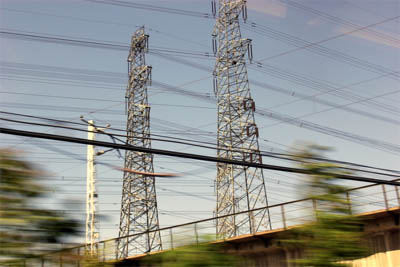
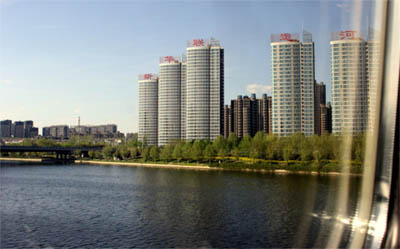
In the train some waitress similarly helped me choose a vegetarian dish, by taking me to the pantry car, and showing me what all preparations they were serving. All that I could choose from the 30 odd dishes were, Chips and Coffee. But what chips, they were roasted; and what cappuccino coffee, it was steaming.
I reached Dalian at 10 pm. It was windy, cold and raining. I had left Delhi when the temperature was 40 degrees Celsius. It was freezing for me here in Dalian. Nataliya had come to receive me along with her business partner Li Batao, a Chinese man. We struggled with language, because all the three of us were using three different languages.
The railway station looked dazzling in spite of the rain. Large beacons of LED lights were placed strategically on the station plaza illuminating it romantically. The raindrops dispersed these rays in different directions. We of course did not wait to see the glamour of the lights because it was late, and drove through incessant rain. They dropped me at the serviced apartment.
This was the end of an eventful journey. I was reminded of Confucius and TAO. How good their teachings must have been centuries back, that they left a mark on the Chinese society forever. It is no doubt that Dalian offers a variety of landscape for anybody who comes to this wonderland, with an exploratory mind. My experience has been that it was really a bombardment of the senses: new sights and sounds, a new language to process, new customs and ways of doing things, different food, and the mix of western and Chinese culture, not to forget the pleasure of a distinct weather.
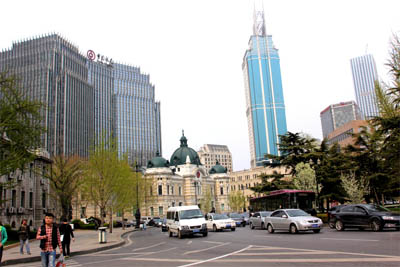
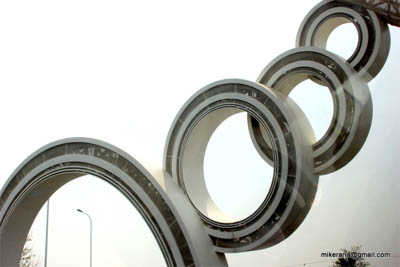
Dalian – Over The Waves
Shanghai, Tianjin, Hangzhou and Hong Kong are important Chinese coastal cities, and each one is, you bet, flourishing. Dalian is another city that started making waves recently. In 1980 Deng Xiaoping called it as a “Window to Northeast”. Being a vibrant and futuristic city, it became an alternate destination for the youth of China. Dalian took almost a hundred years to come up to the level of other favored countries of the world. This is because all its past rulers supported its European framework. So we now see reminiscence of Paris, Vienna and Venice in Dalian.
The culture of pubs, cafes, malls and parks is writ all over the city. It stakes claims on having intimacy with the sea (Yellow Sea), with a coastal length of 1900 kilometers. How about exploring the city in all its vicissitudes? Come with me, we start with an emotion of “Over the Waves”, in Dalian.
An eventful day
Little did I envisage that tomorrow would be an exciting day, as usually every day in this exciting trip was. I expected there would be no limits to my experience; new places, new people and new customs. And I was ready to take them on.
In the train, on the platform at Beijing, as well as on its airport, I did not find any Indian. For example, no Sikh, Malayalli or a Jew who are reputed to be all over the map, were found. And there were no Indian students as is expected in countries like Russia, Belarus and China. The reason for their truancy is primarily the difficulty in language. Will it be the same harrowing experience for me as well, I feared; or will I score over them?
It was my first morning in China. I slept as soon as I had arrived. To be let down by lethargy or jet lag was not what I wanted. I opened eyes in the morning without any such indolence or inertia. It was drizzling outside. It was more like a winter morning in Himachal Pradesh in India. And what a welcome change it was from the heat and dust of Delhi.
Last night’s chill was in my bones still, and I understood that my attire needed attention. If it was not done right away, my adventurous trip might become an insipid memoir. So buying a warm jacket popped up on my shopping list, wherein a hat was earlier on the top.
But first, a cup of coffee deserved my attention, and I expected a different taste and flavor here. It is the same distinction everywhere during my travels; in USA, Canada, UK, Europe, Russia, Belarus etc. And I was certainly not disappointed even here. Sitting on the armchair, I scanned the view outside my window. I was put up in a serviced apartment and I thought it was just the right place for accommodation. It might and it did, give me a reasonable excuse to interact with the locals. Looking out I saw a few elderly men sitting on three wooden benches and chatting. They shared jokes and were oblivious to a traveler watching them. Four or five kids, were playing. Most of them were no doubt early risers. Even in the cold weather!
To sum up the morning set my mood to be just what it should be on the first day. I was ready to receive my hosts Nataliya and Li Batao. They were arriving soon.
The first meeting
When Li Batao and Nataliya arrived I saw them walking from my window. They looked smart and purposeful. Li Batao looked more enthusiastic than Nataliya because it was the first time that he was going to interact with an Indian.
Later I learnt that Mahatma Gandhi and Indian traditions were on his mind for a long time, and he sought a lot of information on them from me. Nataliya had visited me in India before and was rid of the illusion that monkeys and snakes ruled the roast, on the Indian roads. And I certainly did not want to tell them about the cows thereupon, because cows deserved more respect than be seen looking for grass on the roads. And they all had a mystery as to why we treated the ‘cow’ as mother.
“Ni Hao and Dobroye Utro” were exchanged with me respectively as they entered the room and scanned it from all angles. I ushered them in with a smile but was confused about which language I must answer their greetings in.
“Good Morning” was the safe bet from my side; at least this they must be knowing, since they were from the corporate.
“How was the night” she asked in Russian.
“Well I slept like a log” I replied smilingly and offered them coffee.
“That is understandable. It was a long flight. Three legs,” stated Li Batao, participating in our discussion.
They refused the coffee offer, “We are done with our breakfast and let us not waste any time here”.
“In a moment” I said scanning at the attire they were in. Must I match it or chose my own options. They were kind of well prepared for windy, hot and cold weathers. So I did the same. I ensured that I will not be frozen as I was yesterday. And of course I reminded myself that the first available opportunity, I will buy a jacket.
They perhaps had a plan but what it was, they did not share. This usually happened on later occasions as well. They assumed that anything would be okay with me since I was new to the city, and in my position I thought it served as a good surprise.
The action begins
We were starting from Yanan Lu, a residential-cum-commercial area in the downtown zone. The roads in China are called ‘LU’ and the streets ‘JIE’. What a pleasant view it was. The sky was overcast, tall buildings visible hazily on the higher floors, the roads washed in rain, and raindrops still trickling down the trees. They made a heavenly picture especially for a traveler from the hot country as India is. I took a few photographs but was not satisfied with the light.
Here are some of those. The first building, an administrative office of the government, became a nostalgic crescendo later, and looked quite different and amazing on other days.
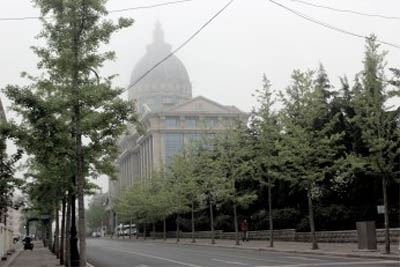
Misty Picture
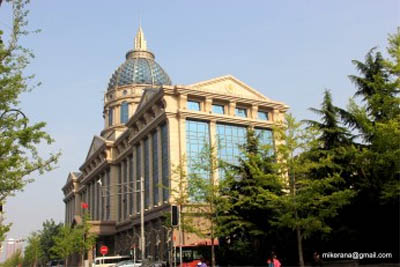
Focused Picture
We grappled and sailed through the office going traffic. The cars moved a bit slower than the normal because of wet roads. Those who did not want to risk driving were seen cheerfully waiting for the public transports. Ladies were seen struggling with the umbrellas turning inside-out due to the incessant strong winds. The office goers and shop owners drove cars whereas probably the sales girls took to the buses. The buses were almost new and no scares were seen on their bodies. Raindrops formed a fuzzy screen on their large windows. On the whole the people looked happy on the roads due to a good quality of life they were leading. This was the first casual impression of mine that day.
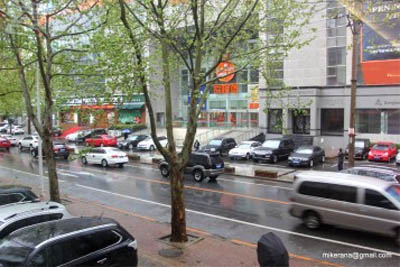
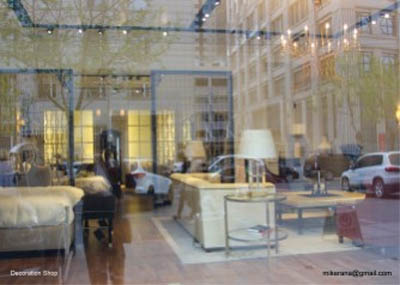
His Volkswagen Passat was 12 years old and it must have taken pains to save it from scratches. As its driver he appeared to be a bit jerky in that disorderly traffic, because everyone was in a hurry for office. But he did not jump any traffic lights.
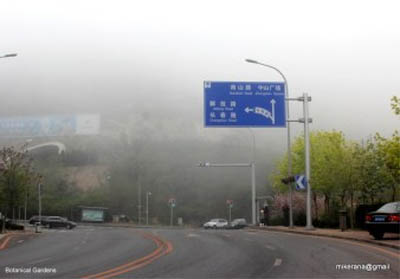
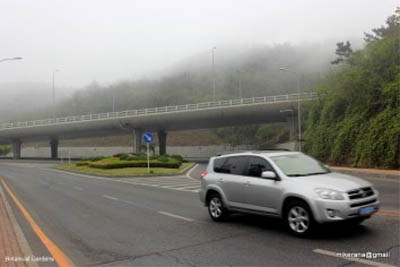
We were passing on the Zhongshan road when I observed a long stretch of trees with pink flowers. They were drooling over the brims of the roads.
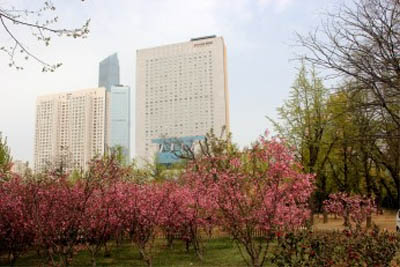
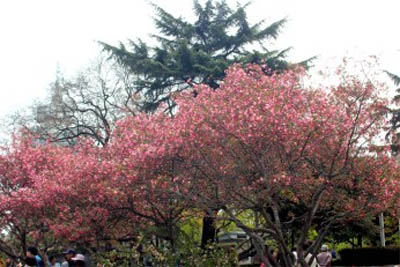
“What do you call these flowers” I asked Li Batao, they appeared familiar to me.
“Sakura, this is the season” he broke out in English.
“I also saw white flowers” I inquired.
“Those are the Acacia”
I knew that it is a famous and popular species in many countries. For example, in Cyprus and Greece it takes a bright yellow color and here it was in a vibrant white. It is also a popular name for products, cafes and people. It was my good luck that I chose the month of May for my trip, rather inadvertently. This is just the time when the Japanese Cherries and Acacia florets bloom luxuriously. They cover the entire city. I suggest that you too chose this month for your travel.
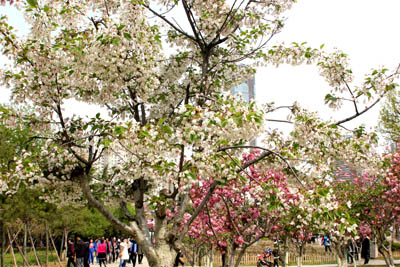
“Do you like Sakura”? asked Nataliya.
“Who would not like it Nataliya? Hundreds of grandiose pictures of Sakura take up the Google pages” I reflected.
“Though we cannot see google here but you will see them in real by the millions” added Nataliya.
And she was right. For the last about 5 minutes or so, on both the sides of the road and streets, I could see a barrage of them. They were absorbing every foot of the streets and it appeared nature had descended to paint the city pink and white. Somewhere, the sunlight fell on tree tops and some other places it filtered through the branches reflecting pinkness everywhere. I wondered why this city was not named as “pink city”. It had the necessary natural ingredients; unlike the pink city of Jaipur in India where pinkness is imparted by stones and paint.
The Olympic Square area
Li Batao continued to drive at a very comfortable speed and I kept clicking. The end of downtown was marked by the absence of tall buildings, and the view opened up for medium sized buildings and small parks surrounding these. We just passed a plaza called the “People Square” and a musical garden in its vicinity. Then we entered a vast open plaza, which Li Batao announced was the Olympic Square.
“Is China hosting another Olympics”, I asked rather naively.
“Yes we are bidding for the 2024 Olympics. In 2022 Asian games will be played here”.
“So why is this Olympic Square been constructed already”?
“No, no. This is an old construction. It was made for the 2008 Beijing Olympics”.
What a tremendous maintenance of the monuments. Notice the 5 rings of the continents in the Olympic Square in the adjoining picture. It appeared as if painted yesterday, although I think the last night’s rain took some credit for it. The sizes of these monuments were humongous and all of them had parking space for thousands of cars. I felt belittled as our politicians in India were not the least worried about maintaining our glorious monuments and our people, worse. We are almost a century behind them in this respect. Somebody must shake our politicians a bit.
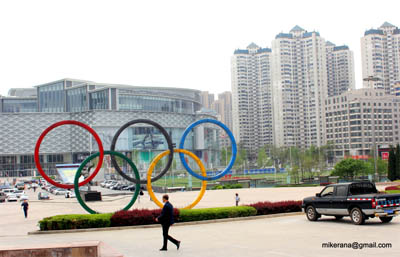
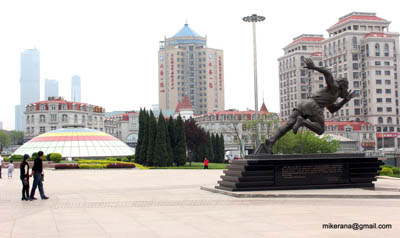
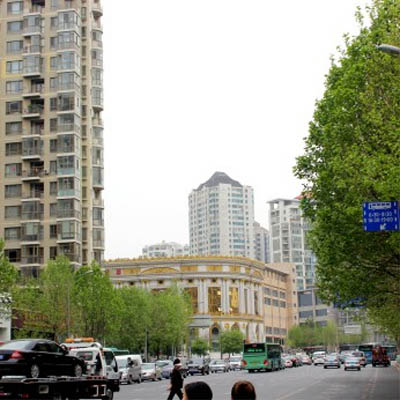
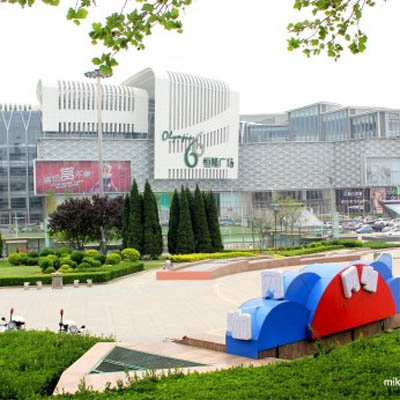
I asked Li Batao the name of that road.
“It is Zhongshan Road” replied Nataliya, “It is one of the main roads in Dalian”.
“Zhongshan” I repeated 5 to 10 times in order to remember and pronounce this name.
The “Golden Gate” Bay Bridge of Dalian
While I was in my day dreaming sequence of everything conceivable about the Olympics and number of golds won by the Chinese in that Olympics, the car took a turn and we swiftly entered a tunnel. My dream sequence was disrupted. I rearranged myself on the seat bracing up to see what was happening around. The ambient light had changed from a bright sunshine to dimmed, but it was adequate inside the tunnel.
The tunnel was called Lotus Hill. “A while later we would be exposed to a breathtaking view”. He added and he smiled.
There traffic was flowing in both the directions, in 4 channels each way. The car headlights were dimmed and they all moved like robots, probably aware of the police cameras and videos around. No one violated the rules. In a while we started seeing light at the end of tunnel. We were going to approach a different spectacle as is customary in long tunnels. But things took a turn for the worse.
It was poles apart from what was promised by Li Batao. The other side of the tunnel opened into a buttermilk sky. It was shrouded in clouds and the visibility was almost zero. The road was meandering continuously. I wondered how Li Batao would drive under that handicap. But other drivers were also under a similar impairment. They all slowed down a bit but a continuous speed of about 50 Kilometers was still maintained.
The clouds were coming back on us as we pierced through them. Jokingly I said “this is like sailing through the clouds in a plane”. The camera that I had prepared for capturing the change of scene was in vain. Nothing was visible. And this tenure of driving hazard continued for a while.
We sensed that we were moving on a road that had pillars flying past us. Were we on a bridge? It lasted a while; probably 5 minutes and the pillars were still flying past us. It appeared that this portion of drive was futile today. Any other day it might be worthwhile. So I posed a question to Li Batao, most hesitatingly, “You mentioned a change of scene, but there is no scene here”.
“Yes, Li Batao this is worthless. Let us go back” Nataliya suggested.
I perceived that she had not been here before and was no longer enthusiastic about it, because nothing was actually visible. Li Batao could not take a reverse turn on a continuously flowing highway traffic. We all had to wait a bit longer for the stop. But this wait proved advantageous. The clouds suddenly started to wander away and we saw better light at a distance, all around. We could now see the silhouettes of tall buildings at the horizon through the front window. And from the rear window some edifices started to emerge on the starboard side of the bridge. A beautiful scene was being manifested, as the car moved on.
“Look, on both sides we are crossing the bay”, and we started to see that we were on top of the sea waves.
It was a suspension bridge and it was about to end. When Li Batao reduced the speed to take a left turn, we saw waves trampling and pounding on the sea shore. Even though the car speed was low, the light was still not enough for a photograph; and surely not for the capture of the distant town on the right side. Some parts were still covered under clouds. One building was conspicuous, though. It was the Castle hotel, that we see on Google. My daughter had insisted that I will bring more photos of this Castle from close quarters.
The mood of car occupants changed for the better. I asked Li Batao, “Where are we headed”?
“It is the new embankment. We call it new Dalian”.
The clouds had thinned out and the view of on and around the suspension bridge was firming up. It seemed alluring. “So why not take a good look at the landscape and the spectacle”, I suggested.
This prompted Li Batao to pull over the car and park in an open space, a vacant uninhabited area. New roads were laid out in that space. We all came out of the car. We needed fresh air perhaps.
That perspective provided a panoramic view, almost 360 degrees were rendered. Two views were laid out on either side of the bridge. One side was the famous Xinghai Square – the largest square in an urban area in the world, and the other side was the Yellow Sea. They were separated from each other by the Xinghai Bay Bridge, which I called as the Golden Gate Bridge in the heading of this text. A few photographs are called for here.
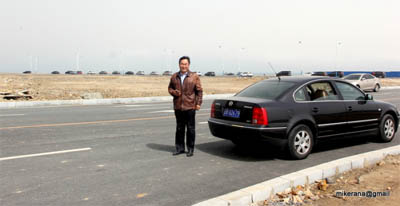
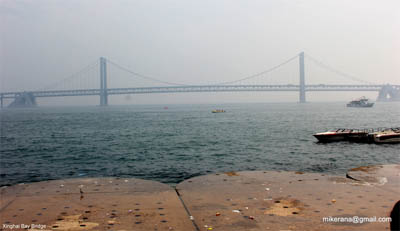
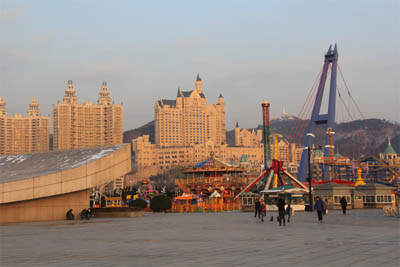
Wanda Sea Mansions – The newer side of Dalian
“Yonder there! A change of scene, the new Dalian residences” his comment came with a kind of show off.
For me the old Dalian was impressive enough. It was based on French style and European architecture. What more could be further anticipated. My mind was not in the saddle for seeing newer buildings, just because they were new. I wanted to engrave instead whatever I had seen for the last half an hour or so. But he seemed excited. Here are some pictures of the new Dalian environs.
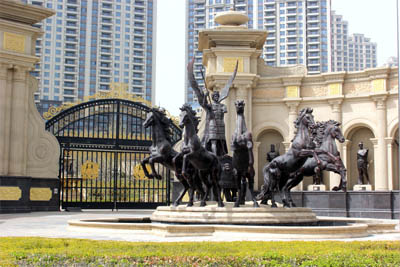
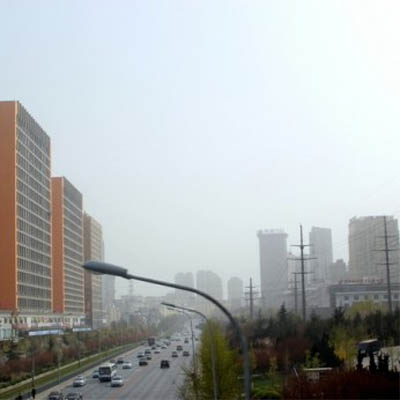
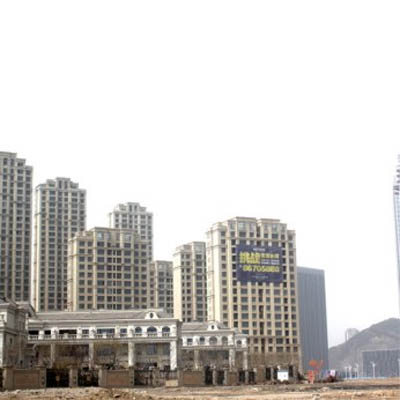
Li Batao then, got back into the car and continued traversing this beautifully constructed neighborhood. They called it “Wanda Sea Mansions”. The circumscribing road had all the required signage and was colorfully flanked by cobblestone roads on for the foot walkers. We continued driving around those buildings and the shopping areas. It was nice, peaceful and not many people were visible on the roads. Perhaps it was not fully occupied and probably possessions were awaited.
I was reminded of an article that appeared in Yahoo in Dec-2015, describing the “Ghost Towns of China”. Could it be one such town? It did not seem though. There may not be many people residing here, yet. But the buildings were far from being empty. Many cars were seen on the roads and rich people were seen entering into these buildings. Chinese are reputed to be making high rise structures, and they are apt to it. They complete a high rise building with super quality in about 18 months. And their aim is not to project richness but effluence that is bourgeois.
I thought our trip must have ended. It was more than two hours of driving and we must return too. But Li Batao had other plans. He had ample energy.
The drive through the forests
“Do you like the forests” he questioned everyone simultaneously.
And who would not. Particularly in those northern hemisphere parts of the world. I hesitated a bit answering that question, thinking that he had already done enough kilometers that day. But Nataliya had no such inhibition. So, we pressed on.
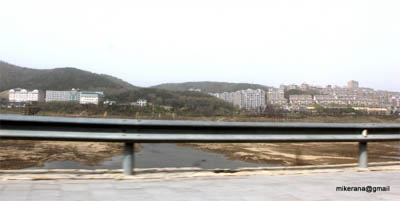
After driving for about half an hour, we passed a township that looked like a painting from the road side. It was about 2 or 3 Kilometers away from the road, and we all appreciated it. Everyone made a comment. It was surrounded by water from a river of some kind and it had a backdrop of hills. Not far from this place we started seeing a scene change. The landscape transformed. Water canals or may be rivers, were crossed. Li Batao mentioned that we were now in the surroundings of forests.
The forests here did not rise enough for a forest in the northern hemisphere. These were shallow tree clusters surrounded by some sort of a lake or a river trained by a small damn. The road was neither a highway nor a boulevard but more like a freeway, high speed but low traffic. It did not have a road divider. It was so clean and the trees obliged it, by not throwing even one leaf on it.
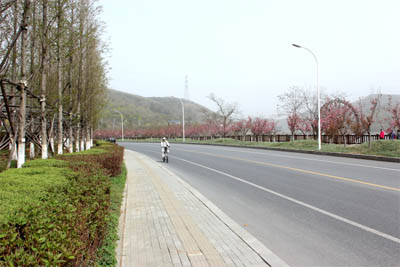
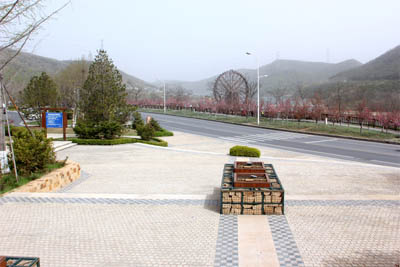
A toilet sign appeared by the roadside and Li Batao offered a visit to the powder room, he said,” It is a nice place”. Before they could refuse the offer I quickly grabbed the opportunity for photography. I had sensed it to be a great place for the photography and I was not disappointed.
I said “Why not. Let us”.
Li Batao took a sharp turn towards the right and brought the car to a well-constructed parking area. We almost jumped out of the car, and spread out in all directions. Our bewilderment ran wild as the spot progressively reveled its beauty. The naked nature had generously placed at the disposal of man a landscape to have a crack with his creativity. And people had not done a bad job of it.
The signboards read “Dalian Western Suburb” and the lake “Tang Li”.
The first attraction was the trees with pink, yellow and white flowers, literally drooling over the branches. They say a picture is worth a thousand words and I do the same here.
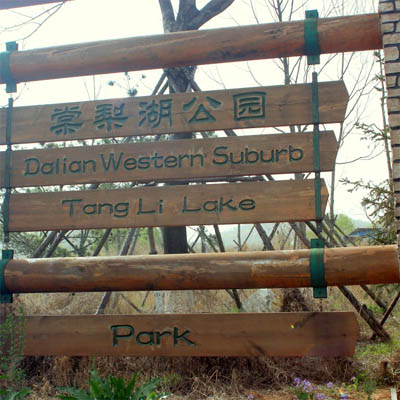
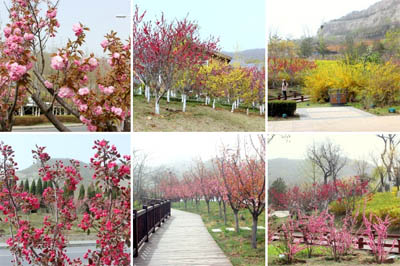
Secondly, we found a small number of families engaged in routine Chinese activities popular in parks, that is cards, eating and tents pitched for the children. Like many foreign countries people bring their own chairs and tables to the park and take them back after use, leaving the place neat and tidy. The children were aged less than 6 or 7 years and mother helped them. Everything was going on in a disciplined manner.
Then we turned our attention to the port side of the road. This was a lake artificially constructed by the engineers, that had three large objects placed inside water, a giant wheel, a tower and a king of pier. They were placed against the back drop of a few mountains, not very large. A dam was visible at a distance. And on the banks we found a beautifully carved wooden resort, a pagoda like structure and a café. There was a spherical body, a large one, that was a collection of bushes and flowers, and it served as an object of photography.
There were many people around and good looking smart girls as well. We were all engaged in clicking photographs using camera and telephones, since no one wanted to be left behind without a personal photograph of this stunning location. I, being an inquisitive photographer, did not miss to click a structure which reminded me of the statue of Christ the Redeemer in Brazil, Rio De Janeiro.
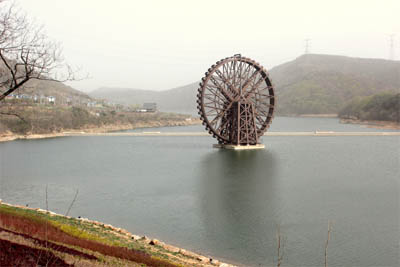
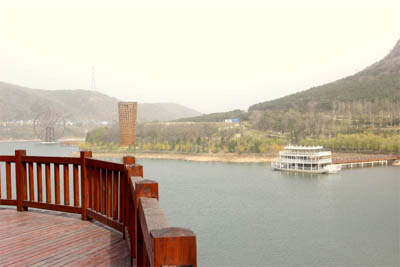
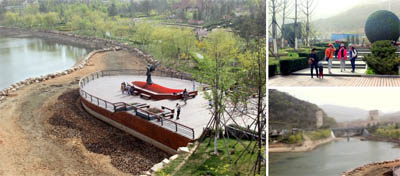

Over the waves
We made a return from this heavenly Tang Li lake after about an hour. On the way we encountered villagers selling their fruits on the roads, a sight quite common in many places in India.
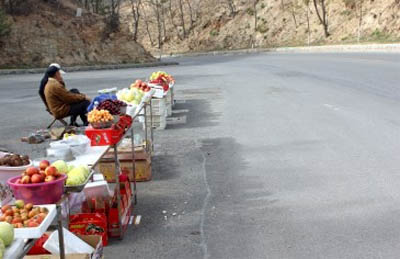

| In the end I would call the first day in China as “Over the Waves”, a nostalgic song for the accordion that I played in my youth. We were over the waves of the Yellow Sea first and then over them as the silent waves in Tang Li lake. I was told there were many locations in Dalian, where the sea met the beaches. The sea was violent sometime and the waves splattered when they dashed into the cemented promenade as in Xinghai square 800 meters bow shaped beach. And they were suddenly quiet in Tang Li. |
Kenny Ausubel: Imagining Our Way Out of the Unimaginable
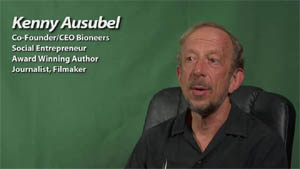
Kenny Ausubel is an award-winning social entrepreneur, author, journalist and filmmaker. He is the Founder and CEO of Bioneers, the internationally recognized nonprofit dedicated to disseminating breakthrough solutions for restoring people and planet. He launched the annual Bioneers Conference in 1990 with his business partner and wife Nina Simons, Bioneers Co-Founder and President.
Kenny is a writer, filmmaker and media professional. Since 2004, he has served as executive producer and co-writer of the award-winning international radio series The Bioneers: Revolution From the Heart of Nature. He acted as a central advisor to Leonardo DiCaprio’s feature documentary, The 11th Hour, and appears in the film.
He has written four books and edited several volumes of the Bioneers anthology book series. His most recent book Dreaming the Future: Reimagining Civilization in the Age of Nature (Chelsea Green 2012) won the Nautilus Grand Gold prize in the Ecology-Environment category. He writes for the Huffington Post.
Transcript is available here: https://medium.com/@bioneers/imagining-our-way-224bad415134#.iehjp7i6c.
Since 1990, Bioneers has acted as a fertile hub of social and scientific innovators with practical and visionary solutions for the world’s most pressing environmental and social challenges.
Bioneers: www.bioneers.org
The Future Now Show
Every month we roam through current events, discoveries, and challenges – sparking discussion about the connection between today and the futures we’re making – and what we need, from strategy to vision – to make the best ones.
Shape the future now, where near-future impact counts and visions and strategies for preferred futures start.
Do we rise above global challenges? Or do we succumb to them? The Future Now Show explores how we can shape our future now – where near-future impact counts. We showcase strategies and solutions that create futures that work.
Every month we roam through current events, discoveries, and challenges – sparking discussion about the connection between today and the futures we’re making – and what we need, from strategy to vision – to make the best ones.
The Future Now Show
June 2017
with
Hardy F Schloer
moderated by
Mustafa Chaudhry
Sometimes changes creep up on us. Will humans evolve into cyborgs? Well, if you think about how much you do through your smartphone, and how you rely on it to communicate (without speech, in general), and to make things happen in your life, then perhaps much of the transition to cyborg is already behind us and we just need the final touches to the interface (chip in the brain etc.). And what about the way we interact with the internet to get the goods we want? It is argued here that the internet-based marketplace is evolving (and AI will accelerate this) into a reactive entity where the needs and desires of people actively and rapidly affect what is offered, even what is made. Suggestive of the merging of the human mind (or minds) with computers. It makes one wonder – where do the boundaries lie? . – Paul Holister
for more information click here
June 2017

Deep sea mining
Deep sea mining is a relatively new mineral retrieval process that takes place on the ocean floor. Ocean mining sites are usually around large areas of polymetallic nodules or active and extinct hydrothermal vents at 1,400 to 3,700 metres (4,600 to 12,100 ft) below the ocean’s surface. – Wikipedia

Source: Greenpeace USA
Should we be mining the seabed for minerals?
British scientists have announced what they are calling an “astonishing” discovery deep in the Atlantic Ocean.
They found that an underwater mountain near the Canary Islands holds some of the richest deposits of rare minerals anywhere on Earth.
Deep-sea mining could transform the globe
by The Economist
News about the Future
Artificial Intelligence 2017: Top 100 Influencers, Brands and Publications
Artificial intelligence – or AI – is a true part of our world, as well as a substantial hub of interest for science and business. Companies are ferociously investing in, engaging in and including artificial intelligence in their operations. It is a fascinating technology that enables new options for companies, from detecting security intrusions to anticipating future consumer purchases.
Some significant moves from tech giants to acquire AI competitiveness have been made in the past five years. This includes the creation of Microsoft Ventures’ fund for AI startups and Uber’s acquisition of AI startup Geometric Intelligence; both in December 2016, Apple acquiring Emotient in early 2016, Google buying Deepmind for $400 million in 2014, and IBM pairing up with Nvidia to enable faster responses for the cognitive

Fiber Optic fabric, Luminous fabric items for decor & fashion
“Our products & illuminated fabric can be used for making the ultimate fashion statement, for special events decoration, for weddings, for marketing & promotional items, for luminous stage costumes & entertainment, for parties, for luxury interior decoration of Homes, Hotels, Night Clubs, Retail outlets, for luminous signage, for creating innovative furniture,… as well as in many industrial applications.
We can provide our fiber optic fabric (illuminated fabric), for your projects in the field of fashion & clothing, interior decoration, special events, promotional items or industrial applications. Our products are designed and made in Europe.”
Digital Fabrication Technologies
The advancement of CNC production methods such as 3D printing is happening hand-in-hand with the increased computational power needed to calculate these high-resolution forms. For the first time, geometric complexity is no longer an impediment, but through its malleability it offers opportunity.
Architecture is now at a critical moment: Material can be synthesized and customized, and bits can be rendered to reality. Digital production methods are at the threshold of enabling the materialization of complexity at a full scale and an ultra-high resolution. Instead of using these technologies to mimic former details and concepts, architecture has to explore this new paradigm in a most radical and open manner.
Benjamin Dillenburger is a practicing architect and assistant professor in architecture at the John H. Daniels Faculty of Architecture, Landscape and Design at the University of Toronto. He previously worked as a senior lecturer in the CAAD group at Swiss Federal Institute of Technology’s architecture department in Zurich.
Benjamin was finalist of the MoMA PS1 Young Architects Program 2015. His projects include the Digital Grotesque installation at the FRAC Archilab 2013 exhibition. He recently exhibited work at the Design Exchange Museum Toronto and the Art Basel / Design Miami.
Revolutionizing the way we build via digital fabrication technologies | Benjamin Dillenburger
Recommended Book

Adults In The Room: My Battle With Europe’s Deep Establishment
by Yanis Varoufakis
What happens when you take on the establishment? In this blistering, personal account, world-famous economist Yanis Varoufakis blows the lid on Europe’s hidden agenda and exposes what actually goes on in its corridors of power.
Varoufakis sparked one of the most spectacular and controversial battles in recent political history when, as finance minister of Greece, he attempted to re-negotiate his country’s relationship with the EU. Despite the mass support of the Greek people and the simple logic of his arguments, he succeeded only in provoking the fury of Europe’s political, financial and media elite. But the true story of what happened is almost entirely unknown – not least because so much of the EU’s real business takes place behind closed doors.
In this fearless account, Varoufakis reveals all: an extraordinary tale of brinkmanship, hypocrisy, collusion and betrayal that will shake the deep establishment to its foundations.
As is now clear, the same policies that required the tragic and brutal suppression of Greece’s democratic uprising have led directly to authoritarianism, populist revolt and instability throughout the Western world.
Adults In The Room is an urgent wake-up call to renew European democracy before it is too late.
Melting of Greenland
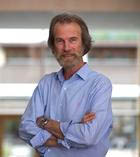
Prof. Dr. Konrad Steffen
Director, Swiss Federal Institute for Forest, Snow and Landscape Research WSL
Professor, Inst. Atmosphere & Climate, ETH-Zürich
Professor, Architecture, Civil and Environmental Engineering, EPF-Lausanne
My general interest is the study of processes related to climate and cryosphere interaction in polar and alpine regions based on in-situ and satellite measurements, and using climate system modeling to study their sensitivity. In particular I study and evaluate sea level changes and sensitivity studies of large ice sheets using in situ and modeling results.
The Earth’s poles are fundamental to the planet’s climate balance, and learning more about how they work through research is crucial. Every May, I travel to Western Greenland to the Swiss Camp, where our team has been collecting data on snow cover, ice and the atmosphere with various instruments since 1990.
The Melting of Greenland: Prof Konrad Steffen (March 2017)
Futurist Portrait: Daniel Simon

Daniel Simon is a German-born concept designer, author, and producer, with professional roots as a senior designer at Bugatti and Volkswagen. Clients include Warner Bros., Universal, Disney, Lotus, and SpaceX. After working in Spain, England, Brazil, and Japan, Simon settled in Los Angeles, where he focuses his acclaimed style on creating iconic fantasy vehicles for Hollywood blockbuster films such as Tron: Legacy, Captain America: The First Avenger, Prometheus, and Oblivion. He also offers automotive-design services, lectures, and works on his own vehicle-centered fantasy worlds, available as books: Cosmic Motors™ and The Timeless Racer®.
Daniel Simon: Conceptual Designer and Automotive Futurist (Part 1)
The future of money, trade and finance – Chris Skinner, at USI


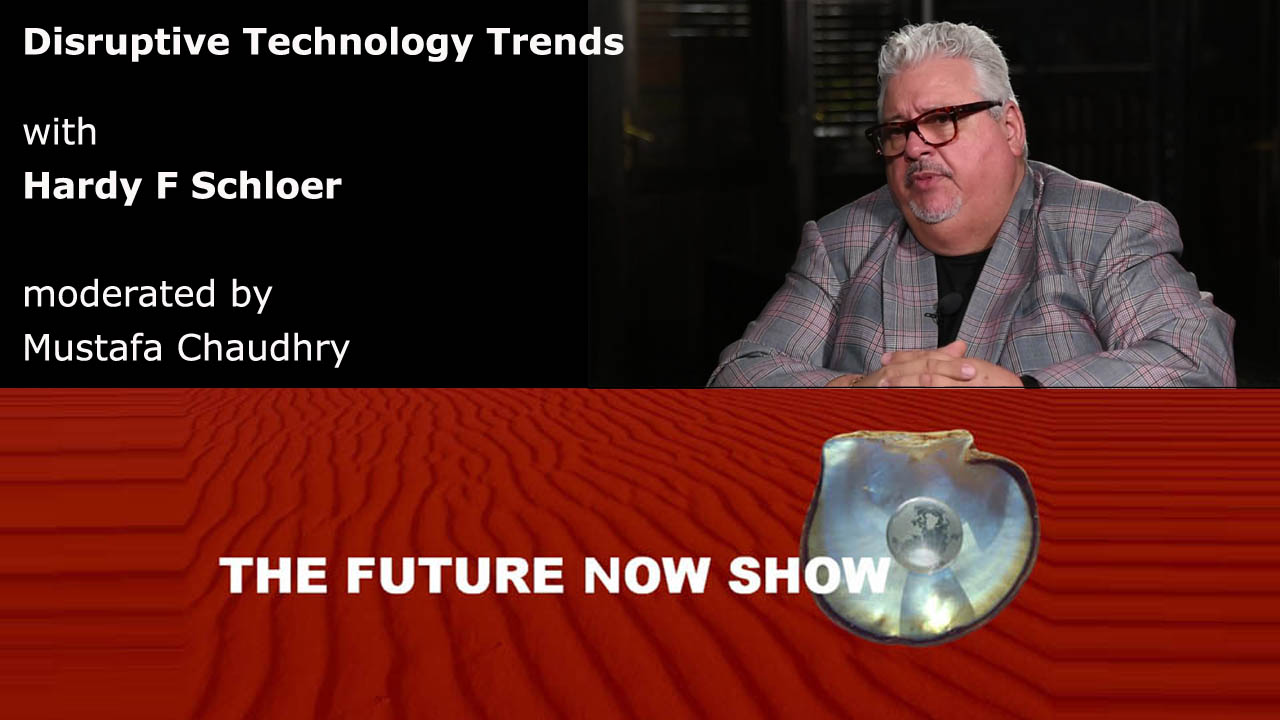


Customer Reviews
Thanks for submitting your comment!